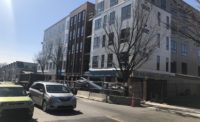Boston Implements Full Construction Reopening Plan
COVID-19 concerns loom as project teams get back to work

Boston has completed the final phase of reopening construction in the city, which was one of the most vibrant on the East Coast before the coronavirus shutdown.
After initially limiting construction to essential projects like new hospital buildings and housing, Boston has lifted its remaining restrictions, allowing commercial construction, such as office towers, to move forward as well.
Boston officials recently wrapped up safety plan approvals, giving a green light to more than 3,000 different projects to move forward, from home renovations to multi-story towers.
[For ENR’s latest coverage of the impacts of the COVID-19 pandemic, click here]
The Massachusetts Dept. of Public Health reported on June 23 that the state's death toll reached 7,890, with the number of people infected hitting 107,439. Suffolk County's death toll reached 979 as of June 24, with 19,601 confirmed cases.
Boston city officials shut down all but emergency construction in mid-March as coronavirus deaths and infections soared.
In order to get permission to reopen, contractors are required to take an array of safety measures. These include installing handwashing stations, requiring the use of masks and other personal protective equipment, temperature checks, and ensuring that workers follow social distancing guidelines.
“We are seeing action in every single ward, in all 22 wards of the city,” said Patrick Brophy, chief of operations for Boston Mayor Martin J. Walsh.
Contractors are taking varying approaches to ensuring that workers have space to socially distance while also getting their jobs done.
Some have been bringing back different trades one at a time, or stationing different trades on different floors, Brophy said, characterizing it as a slow but steady ramp up.
“We are not seeing a whole lot of people shutting things down,” Brophy said. “We are starting to see more traffic in the city and more life. Where you used to be able to fly into town in five or 10 minutes, it is now taking me 15 or 20 minutes.”
Still, faced with a much tougher economy now compared to the beginning of the year before the pandemic, some developers have been forced to restructure their plans amid financing issues.
Millennium Partners, which is building the $1.3 billion Winthrop Center tower in downtown Boston, recently announced they would be ditching plans for multimillion-dollar luxury condominiums.
The project will now have 321 residential units, down from 387 before, and they will be apartments, not luxury condos.
The move will shave $80 million off the project’s cost and comes as Millennium looks to raise another $800 million for lenders, a process that got sidetracked when the coronavirus lockdown hit in March.
There are also ongoing concerns about the safety of construction workers, with coronavirus infections continuing to be reported on a daily basis in Massachusetts, albeit at a far lower level than two months ago.
Francis Callahan, president of the Massachusetts Building Trades Council, recently took Gov. Charlie Baker (R) to task for a policy of “zero tolerance” for workers who report to their jobs while sick.
Callahan contends state regulations use much softer language when discussing employer obligations under the new coronavirus safety rules, with phrases like “where feasible” and “if possible.”
“ZERO TOLERANCE must apply across the board,” Callahan wrote.
The state rules also fail to carve out protections for workers who refuse work at a construction site because of unsafe conditions, Callahan contends.
And engineers and design firms are moving cautiously as well when it comes to reopening their offices, with Massachusetts recently giving a green light for offices to reopen to 50% of their pre-Covid-19 capacity.
Robin Greenleaf, CEO and founder of Architectural Engineers in Boston, said her firm is moving cautiously towards a partial reopening of its offices, with a July 14 target date.
The plan initially is for employees to come into the firm’s downtown Boston offices twice a week, with plans for temperature checks before employees are allowed into the office, Plexiglas partitions, while also looking to procure ample stocks of hand sanitizer and cleaning products.
Architectural Engineers has also paid to equip its employees at home with work stations as well.
“It is just going to take time for people to regain the confidence they can come to an office environment and feel safe,” Greenleaf said. “There is always the possibility of a resurgence where we have to shut down again.”




